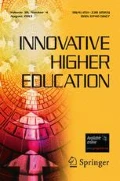Abstract
Using data collected from a qualitative case study of an online baccalaureate nursing program, we examined the influence of online degree programs on undergraduate student socialization and learning. We considered how components of socialization—knowledge acquisition, investment, and involvement—are influenced by the online context. The findings suggest the importance of considering non-academic influences in regards to nontraditional student experiences. The theoretical intersection of online learning and undergraduate student development offers new and significant areas of research, specifically related to the pedagogical role of faculty and the impact of social engagement. Implications for future research and practice are offered.
Similar content being viewed by others
References
Aldrich, C. (2005). Learning by doing: A comprehensive guide to simulations, computer games, and pedagogy in e-learning. Hoboken, NJ: Wiley.
Alexander, S., & Boud, D. (2001). Learners still learn from experience when online. In J. Stephenson (Ed.), Teaching and learning online: Pedagogies for new technologies (pp. 3–15). Sterling, VA: Routledge/Stylus Publishing.
Allen, I. E., & Seaman, J. S. (2006). Making the grade: Online education in the United States. Needham, MA: SLOAN-C.
Bean, J., & Metzner, B. (1985). A conceptual model of nontraditional undergraduate student attrition. Review of Educational Research, 55(4), 485–540.
Boaler, J. (2000). Exploring situated insights into research and learning. Journal for Research in Mathematics Education, 39(1), 113–119.
Cobb, P., & Bowers, J. (1999). Cognitive and situated learning perspectives in theory and practice. Educational Researcher, 28(2), 4–15.
Donaldson, J., & Graham, S. (1999). A model of college outcomes for adults. Adult Education Quarterly, 50(1), 24–40.
Eisenhart, M., & Howe, K. (1992). Validity in educational research. In M. LeCompte, W. Millroy, & J. Preissle (Eds.), The handbook of qualitative research in education (pp. 642–680). San Diego, CA: Academic.
Goetz, J. P., & LeCompte, M. D. (1984). Ethnography and qualitative design in educational research. Orlando, FL: Academic.
Graham, S., & Gisi, S. (2000). Adult undergraduate students: What role does college involvement play? NASPA Journal, 38(1), 99–121.
Hagedorn, L. (2005, Jan/Feb). Square pegs: Adult students and their “fit” in postsecondary institutions. Change, 37, 22–29.
Hatch, J. A. (2002). Doing qualitative research in education settings. Ithaca, NY: State University of New York Press.
Hill, J. (2006). Flexible learning environments: Leveraging the affordances of flexible delivery and flexible learning. Innovative Higher Education, 31(3), 187–197.
Justice, E., & Dornan, T. (2001). Metacognitive differences between traditional-age and nontraditional-age college students. Adult Education Quarterly, 51(3), 236–249.
Kasworm, C. (2003). Adult meaning making in the undergraduate classroom. Adult Education Quarterly, 53(2), 81–98.
Lave, J., & Wenger, E. (1991). Situated learning: Legitimate peripheral participation. New York, NY: Cambridge University Press.
Lincoln, Y., & Guba, E. (1985). Naturalistic inquiry. Thousand Oaks, CA: Sage.
Mann, C., & Stewart, F. (2000). Internet communication and qualitative research: A handbook for researching online. London, England: Sage.
McCombs, B., & Vakili, D. (2005). A learner-centered framework for e-learning. Teachers College Record, 107(8), 1582–1600.
Miles, M., & Huberman, A. (1994). Qualitative data analysis (2nd ed.). Thousand Oaks, CA: Sage.
Palloff, R., & Pratt, K. (2005). Collaborating online: Learning together in community. San Francisco, CA: Jossey-Bass.
Richardson, J., & Newby, T. (2006). The role of students’ cognitive engagement in online learning. American Journal of Distance Education, 20(1), 23–37.
Strauss, A., & Corbin, J. (1998). Basics of qualitative research: Techniques and procedures for developing grounded theory. Thousand Oaks, CA: Sage.
Summers, J., Waigandt, A., & Whittaker, T. (2005). A comparison of student achievement and satisfaction in an online versus a traditional face to face statistics class. Innovative Higher Education, 29(3), 233–250.
Weidman, J. (1989). Undergraduate socialization: A conceptual approach. In J. Smart (Ed.), Higher education: Handbook of theory and research, V, (pp. 289–322). New York, NY: Agathon.
Weidman, J., Twale, D., & Stein, E. (2001). Socialization of graduate and professional students in higher education: A perilous passage? ASHE-ERIC Higher Education Report, 28. San Francisco, CA: Jossey-Bass.
Wyatt, G. (2005). Satisfaction, academic rigor and interaction: Perceptions of online instruction. Education, 125, 460–468.
Author information
Authors and Affiliations
Corresponding author
Additional information
Karri A. Holley
received her Ph.D. from the University of Southern California. She is Assistant Professor at the University of Alabama. Her research interests include graduate/professional education, interdisciplinary curricula, and qualitative inquiry.
Barrett J. Taylor
is a Ph.D. student at the University of Georgia. His research focuses on religious colleges and universities.
Rights and permissions
About this article
Cite this article
Holley, K.A., Taylor, B.J. Undergraduate Student Socialization and Learning in an Online Professional Curriculum. Innov High Educ 33, 257–269 (2009). https://doi.org/10.1007/s10755-008-9083-y
Published:
Issue Date:
DOI: https://doi.org/10.1007/s10755-008-9083-y



